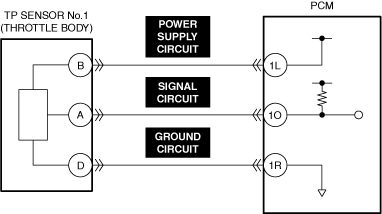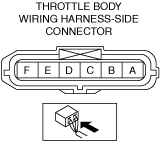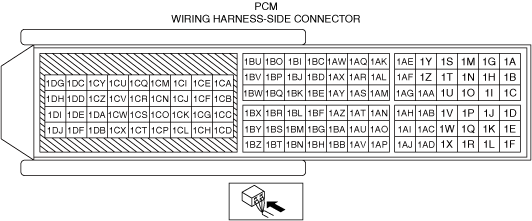DTC P0123:00 [PCM (SKYACTIV-G)]
DTC P0123:00 [PCM (SKYACTIV-G)]
SM2334511
id0102t4701900
Outline
|
System malfunction location |
TP sensor No.1 circuit high input |
||||
|---|---|---|---|---|---|
|
Detection condition
|
• If the PCM detects that the TP sensor No.1 voltage at the PCM terminal 1O is above 4.9 V, the PCM determines that the TP sensor No.1 circuit has a malfunction.
|
||||
|
Fail-safe
|
• Restricts the upper limit of the engine speed.
• PCM restricts engine torque.
|
||||
|
Possible cause
|
• Throttle body connector or terminals malfunction
• PCM connector or terminals malfunction
• TP sensor No.1 malfunction
• Short to power supply in TP sensor No.1 signal circuit
• Open circuit in any of the following TP sensor No.1 circuits.
• PCM malfunction
|
||||
 |
|||||
 |
|||||
 |
|||||
Diagnostic Procedure
|
Step |
Inspection |
Results |
Action |
|---|---|---|---|
|
1
|
RECORD VEHICLE STATUS WHEN DTC WAS DETECTED TO UTILIZE WITH REPEATABILITY VERIFICATION
• Record the freeze frame data/snapshot data.
|
—
|
Go to the next step.
|
|
2
|
VERIFY RELATED REPAIR INFORMATION OR SERVICE INFORMATION AVAILABILITY
• Verify related Service Bulletins, on-line repair information, or Service Information availability.
• Is any related Information available?
|
Yes
|
Perform repair or diagnosis according to the available information.
• If the vehicle is not repaired, go to the next step.
|
|
No
|
Go to the next step.
|
||
|
3
|
DETERMINE IF TP SENSOR No.1 OR CONNECTOR CONNECTIONS MALFUNCTION
• Access the TP1 PID using the M-MDS. (See PID/DATA MONITOR INSPECTION.)
• Verify the TP1 PID value.
• Is the TP1 PID value 5 V or B+?
|
Yes
|
Go to Step 7.
|
|
No
|
Go to the next step.
|
||
|
4
|
INSPECT THROTTLE BODY CONNECTOR FOR MALFUNCTION
• Inspect the applicable connector and terminal. (See CONNECTOR INSPECTION.)
• Are the connector and terminal normal?
|
Yes
|
Go to the next step.
|
|
No
|
Repair or replace the malfunctioning location and perform the repair completion verification.
|
||
|
5
|
INSPECT PCM CONNECTOR FOR MALFUNCTION
• Inspect the applicable connector and terminal. (See CONNECTOR INSPECTION.)
• Are the connector and terminal normal?
|
Yes
|
Go to the next step.
|
|
No
|
Repair or replace the malfunctioning location and perform the repair completion verification.
|
||
|
6
|
INSPECT TP SENSOR No.1 FOR MALFUNCTION
• Inspect the applicable part. (See THROTTLE POSITION (TP) SENSOR INSPECTION [SKYACTIV-G (WITH CYLINDER DEACTIVATION (US))].) (See THROTTLE POSITION (TP) SENSOR INSPECTION [SKYACTIV-G (WITHOUT CYLINDER DEACTIVATION (US))].)
• Is the part normal?
|
Yes
|
Go to repair completion verification.
|
|
No
|
Repair or replace the malfunctioning location and perform the repair completion verification.
|
||
|
7
|
DETERMINE IF TP SENSOR No.1 OR WIRING HARNESS MALFUNCTION
• Switch the ignition off.
• Disconnect the throttle body connector.
• Access the TP1 PID using the M-MDS. (See PID/DATA MONITOR INSPECTION.)
• Verify the TP1 PID value.
• Is the TP1 PID value 5 V or B+?
|
Yes
|
Go to the next step.
|
|
No
|
Go to Step 9.
|
||
|
8
|
INSPECT TP SENSOR No.1 SIGNAL CIRCUIT FOR OPEN CIRCUIT
• Inspect the applicable circuit for open circuit. (See CIRCUIT INSPECTION.)
• Is the circuit normal?
|
Yes
|
Inspect the signal circuit for a short to power supply.
(See CIRCUIT INSPECTION.)
• Repair or replace the malfunctioning location and perform the repair completion verification.
|
|
No
|
Repair or replace the malfunctioning location and perform the repair completion verification.
|
||
|
9
|
INSPECT TP SENSOR No.1 POWER SUPPLY CIRCUIT AND GROUND CIRCUIT FOR OPEN CIRCUIT
• Inspect the applicable circuit for open circuit. (See CIRCUIT INSPECTION.)
• Is the circuit normal?
|
Yes
|
Replace the throttle body and perform the repair completion verification.
|
|
No
|
Repair or replace the malfunctioning location and perform the repair completion verification.
|
||
|
Repair completion verification 1
|
VERIFY THAT VEHICLE IS REPAIRED
• Install/connect the part removed/disconnected during the troubleshooting procedure.
• Clear the DTC recorded in the memory. (See CLEARING DTC.)
• Replicate the vehicle conditions at the time the DTC was detected using the following procedure.
• Perform the DTC inspection for the PCM. (See DTC INSPECTION.)
• Is the same Pending DTC present?
|
Yes
|
Refer to the controller area network (CAN) malfunction diagnosis flow to inspect for a CAN communication error.
If the CAN communication is normal, perform the diagnosis from Step 1.
• If the malfunction recurs, replace the PCM, then go to the next step. (See PCM REMOVAL/INSTALLATION [SKYACTIV-G (WITH CYLINDER DEACTIVATION (US))].) (See PCM REMOVAL/INSTALLATION [SKYACTIV-G (WITHOUT CYLINDER DEACTIVATION (US))].)
|
|
No
|
Go to the next step.
|
||
|
Repair completion verification 2
|
VERIFY IF OTHER DTCs DISPLAYED
• Perform the DTC inspection. (See DTC INSPECTION.)
• Are any other DTCs displayed?
|
Yes
|
Repair the malfunctioning location according to the applicable DTC troubleshooting.
|
|
No
|
DTC troubleshooting completed.
|